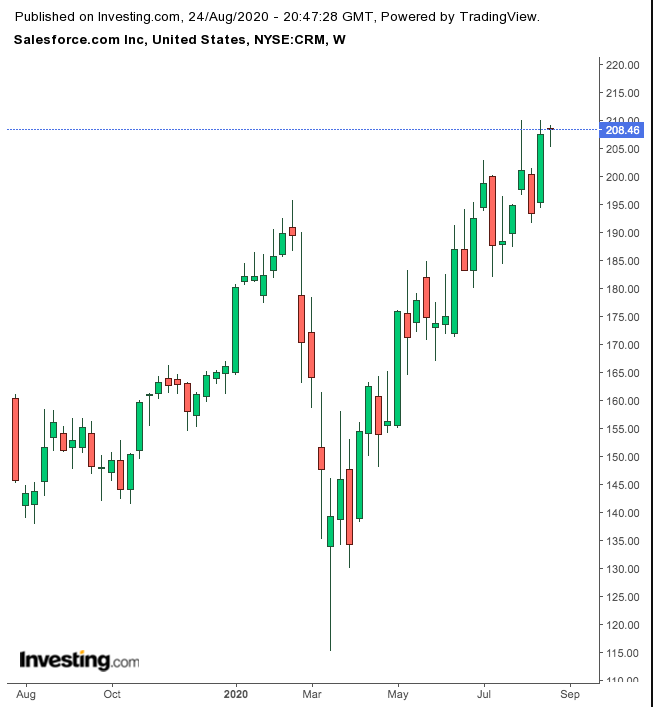Salesforce.com Q2 Earnings Preview: Growth By Acquisition Eyed As Shares Rise
Investing.com | Aug 25, 2020 09:51AM ET
* Reports Q2 2020 results on Tuesday, Aug. 25, after the close
* Revenue expectation: $4.9 billion
* EPS expectation: $0.67
When Salesforce.com (NYSE:CRM) reports its second-quarter earnings later today, investors will be keen to know whether its latest acquisitions are helping to fuel growth.
Salesfore.com, which sells software and cloud-based services to corporate clients, has expanded massively in recent years after a spree of acquisitions––part of its plan to diversify its revenue base and power further growth.
The San Francisco-based customer relationship management firm last year acquired software maker Tableau Software for $15.3 billion, its largest transaction to date. The deal was part of its move to expand into the business intelligence market.
The company’s latest earnings reports show that these bets have begun to pay off. Salesforce has been profitable for 10 of the 12 most recent quarters, and acquisitions have helped the company become less reliant on its premier Sales Cloud product.
In the company’s most recent quarter, the largest proportion of subscriptions and support revenue was in the “Platform and Other” category, which includes contributions from integration software MuleSoft and charting tools provided by Tableau. The "Platform and Other" segment delivered 30% of subscription and support revenue, compared with 15% five years ago.
Investors and analysts are excited about the Salesforce growth prospects even after the surprise departure of co-chief executive officer Keith Block early this year, making Marc Benioff the sole CEO once again.
Salesforce shares are up 24% this year, rebounding strongly from the March dip. They closed Monday at $208.46, up 0.45% on the day.
Despite this mostly bullish outlook, Salesforce is facing some headwinds from the tough operating environment in the aftermath of the COVID-19 pandemic. While announcing Q1 earnings in late May, the company trimmed its annual sales forecast, indicating that the coronavirus-induced recession has weakened demand for the software-maker’s cloud applications.

Sales in fiscal 2021 will be about $20 billion, down from an earlier projection of as much as $21.1 billion. The company expects profit, excluding some items, of $2.93 to $2.95 a share.
Benioff, while acknowledging these threats, believes that the company’s business model is strong enough to deal with the short-term challenges and maintain its long-term earnings potential.
In the past quarter, Salesforce announced a deal with AT&T (NYSE:T), one of its biggest, that will allow the wireless giant to compile customer data into one place and access it from multiple touch points.
Bottom Line
Salesforce has a great track record of delivering consistently higher growth over the past decade. Despite a trimmed sales forecast for the current fiscal year, Wall Street remains confident in its growth going forward, especially after its latest acquisitions that provide a broader presence in a number of key markets. For these reasons, we believe any post-earnings weakness should be taken as a buying opportunity.
Trading in financial instruments and/or cryptocurrencies involves high risks including the risk of losing some, or all, of your investment amount, and may not be suitable for all investors. Prices of cryptocurrencies are extremely volatile and may be affected by external factors such as financial, regulatory or political events. Trading on margin increases the financial risks.
Before deciding to trade in financial instrument or cryptocurrencies you should be fully informed of the risks and costs associated with trading the financial markets, carefully consider your investment objectives, level of experience, and risk appetite, and seek professional advice where needed.
Fusion Media would like to remind you that the data contained in this website is not necessarily real-time nor accurate. The data and prices on the website are not necessarily provided by any market or exchange, but may be provided by market makers, and so prices may not be accurate and may differ from the actual price at any given market, meaning prices are indicative and not appropriate for trading purposes. Fusion Media and any provider of the data contained in this website will not accept liability for any loss or damage as a result of your trading, or your reliance on the information contained within this website.
It is prohibited to use, store, reproduce, display, modify, transmit or distribute the data contained in this website without the explicit prior written permission of Fusion Media and/or the data provider. All intellectual property rights are reserved by the providers and/or the exchange providing the data contained in this website.
Fusion Media may be compensated by the advertisers that appear on the website, based on your interaction with the advertisements or advertisers.